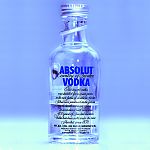
Low-alcohol beer is beer with little or no alcohol by volume that aims to reproduce the taste of beer while eliminating or reducing the inebriating effect, carbohydrates, and calories of regular alcoholic brews. Low-alcohol beers can come in different beer styles such as lagers, stouts, and ales. Low-alcohol beer is also known as light beer, non-alcoholic beer, small beer, small ale, or near-beer.

Beer in Sweden has a history that can be traced to the late Iron Age.

Vodka is a clear distilled alcoholic beverage. Different varieties originated in Poland, Russia, and Sweden. Vodka is composed mainly of water and ethanol but sometimes with traces of impurities and flavourings. Traditionally, it is made by distilling liquid from fermented cereal grains, and potatoes since introduced in Europe in the 1700s. Some modern brands use corn, sugar cane, fruits, honey, and maple sap as the base.

Systembolaget, colloquially known as systemet or bolaget, is a government-owned chain of liquor stores in Sweden. It is the only retail store allowed to sell alcoholic beverages that contain more than 3.5% alcohol by volume. Systembolaget acts as a portal for private companies selling alcohol on the Swedish market and as of 2023, it represents 1,200 vendors ranging from small local breweries to large scale importers and multinational companies, selling products from a total of over 5,000 producers from all over the world.

Alko Inc is the national alcoholic beverage retailing monopoly in Finland. It is the only store in the country which retails beer over 5.5% ABV, wine and spirits. Alcoholic beverages are also sold in licensed restaurants and bars but only for consumption on the premises.

Liquor is an alcoholic drink produced by the distillation of grains, fruits, vegetables, or sugar that have already gone through alcoholic fermentation. Other terms for liquor include: spirit, distilled beverage, booze, spirituous liquor or hard liquor. The distillation process concentrates the liquid to increase its alcohol by volume. As liquors contain significantly more alcohol (ethanol) than other alcoholic drinks, they are considered "harder." In North America, the term hard liquor is sometimes used to distinguish distilled alcoholic drinks from non-distilled ones, whereas the term spirits is more commonly used in the UK. Some examples of liquors include vodka, rum, gin, and tequila. Liquors are often aged in barrels, such as for the production of brandy and whiskey, or are infused with flavorings to form flavored liquors, such as absinthe.

WKD, pronounced as Wicked, is a brand of alcopop produced by Beverage Brands. It is sold and heavily marketed in the United Kingdom and Ireland with the slogan ‘Have you got a WKD side?’, and also in many countries in mainland Europe. AC Nielsen ranked it as the number-one UK ready to drink (RTD) alcopop in 2006. In December 2014 to comply with alcohol tax laws and to minimise future tax increases, “Alcoholic Mix WKD” replaced the old “Original WKD”, and the old Original Mix is now no longer available in both the UK and Ireland. The small change to the alcohol element of the WKD was not intended to change the taste of the product and still contains triple distilled vodka. In addition, it contains an alternative alcohol base to minimise tax. The actual recipe remains unchanged. The WKD bottling facility in Ayrshire, Scotland closed in November 2022 due to rising costs.
Brennivín is considered to be Iceland's signature distilled beverage. It is distilled from fermented grain mash and then combined with Iceland's very soft, high-pH water, and flavored only with caraway. A clear, savory, herbal spirit, the taste is often described as having notes of fresh rye bread. It is considered to be a type of aquavit and bottled at 40% ABV. The steeping of herbs in alcohol to create schnapps is a long-held folk tradition in Nordic countries, and Brennivín is still the traditional drink for the mid-winter feast of Þorrablót. Today, Icelanders typically drink it chilled, as a shot, with a beer, or as a base for cocktails. It often takes the place of gin in classic cocktails, or of a lighter rum in tropical drinks.
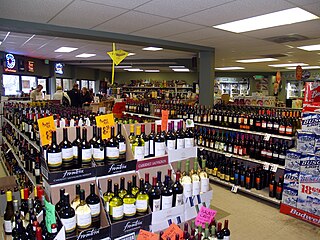
A liquor store is a retail business that predominantly sells prepackaged alcoholic beverages, including liquors, wine or beer, usually intended to be consumed off the store's premises. Depending on region and local idiom, they may also be called an off-licence, off-sale, bottle shop, bottle store or, colloquially, bottle-o, liquor store or other similar terms. A very limited number of jurisdictions have an alcohol monopoly. In US states that are alcoholic beverage control (ABC) states, the term ABC store may be used.
Alcoholic beverage control states, generally called control states, less often ABC states, are 17 states in the United States that have state monopoly over the wholesaling or retailing of some or all categories of alcoholic beverages, such as beer, wine, and distilled spirits.

Spendrups Bryggeri AB is a Swedish brewery founded in 1897 as Grängesbergs Bryggeri AB. The company includes the following subsidiaries Spring Wine & Spirits, Gotlands Bryggeri and Hellefors Bryggeri. Spendrups Group has approximately 900 employees and sales revenue of approximately 3 billion Swedish kronor.

Krönleins Brewery is a Swedish brewery founded in 1836 by Anders Julius Appeltofft in Halmstad, Sweden.
An alcohol-free or non-alcoholic drink, also known as a temperance drink, is a version of an alcoholic drink made without alcohol, or with the alcohol removed or reduced to almost zero. These may take the form of a non-alcoholic mixed drink or non-alcoholic beer, and are widely available where alcoholic drinks are sold.

Chūhai, an abbreviation of "shōchū highball" (焼酎ハイボール), is an alcoholic drink originating from Japan.

A liquor license is a governmentally issued permit for businesses to sell, manufacture, store, or otherwise use alcoholic beverages.
Explorer Vodka is a Swedish Wheat vodka brand manufactured by the V&S Group, formerly owned by the Swedish government. It was developed in the 1950s, targeted for customers in the United States, but its 1958 launch failed in the market. It was instead released in Sweden from 1961. Ever since "Explorer" has been one of Sweden's most popular brands of vodka, and has during some periods been the most sold distilled beverages in Sweden. It was the first Swedish alcoholic beverage to be termed vodka rather than brännvin.
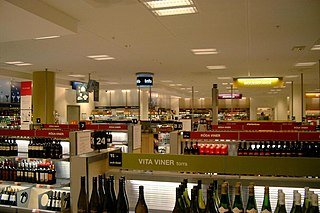
An alcohol monopoly is a government monopoly on manufacturing and/or retailing of some or all alcoholic beverages, such as beer, wine and spirits. It can be used as an alternative for total prohibition of alcohol. They exist in all Nordic countries except Denmark proper, and in all provinces and territories in Canada except Alberta. In the United States, there are some alcoholic beverage control states, where alcohol wholesale is controlled by a state government operation and retail sales are offered by either state or private retailers.
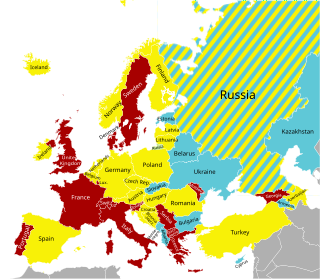
An alcoholic beverage is a drink that contains ethanol, a type of alcohol and is produced by fermentation of grains, fruits, or other sources of sugar. The consumption of alcoholic drinks, often referred to as "drinking", plays an important social role in many cultures. Alcoholic drinks are typically divided into three classes—beers, wines, and spirits—and typically their alcohol content is between 3% and 50%.

Alcohol laws are laws relating to manufacture, use, being under the influence of and sale of alcohol or alcoholic beverages. Common alcoholic beverages include beer, wine, (hard) cider, and distilled spirits. Definition of alcoholic beverage varies internationally, e.g., the United States defines an alcoholic beverage as "any beverage in liquid form which contains not less than one-half of one percent of alcohol by volume". Alcohol laws can restrict those who can produce alcohol, those who can buy it, when one can buy it, labelling and advertising, the types of alcoholic beverage that can be sold, where one can consume it, what activities are prohibited while intoxicated, and where one can buy it. In some cases, laws have even prohibited the use and sale of alcohol entirely.
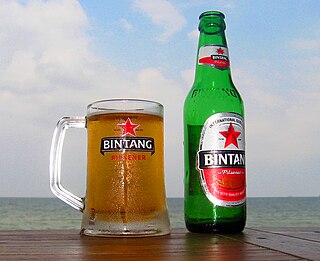
Alcohol in Indonesia refers to the alcohol industry, alcohol consumption and laws related to alcohol in the South East Asian country of Indonesia. Indonesia is a Muslim majority country, yet it is also a pluralist, democratic and secular nation. These social and demographic conditions led to Islamic parties and pressure groups pushing the government to restrict alcohol consumption and trade, while the government carefully considers the rights of non-Muslims and consenting adults to consume alcohol, and estimates the possible alcohol ban effects on Indonesian tourism and the economy.
